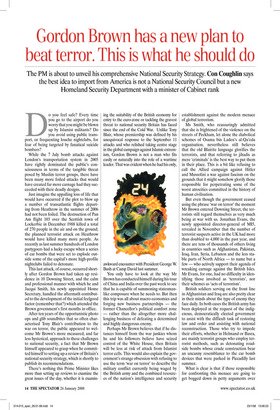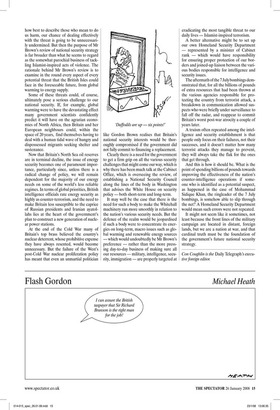Gordon Brown has a new plan to beat terror. This is what he should do
The PM is about to unveil his comprehensive National Security Strategy. Con Coughlin says the best idea to import from America is not a National Security Council but a new Homeland Security Department with a minister of Cabinet rank Do you feel safe? Every time you go to the airport do you worry that you might be blown up by Islamist militants? Do you avoid using public transport, or frequenting louche nightclubs, for fear of being targeted by fanatical suicide bombers?
While the 7 July bomb attacks against London’s transportation system in 2005 have rightly dominated the public’s consciousness in terms of the tangible threat posed by Muslim terror groups, there have been many more foiled attacks that would have created far more carnage had they succeeded with their deadly designs.
Just imagine the appalling loss of life that would have occurred if the plot to blow up a number of transatlantic flights departing from Heathrow in the summer of 2006 had not been foiled. The destruction of Pan Am flight 103 over the Scottish town of Lockerbie in December 1988 killed a total of 270 people in the air and on the ground; the planned terrorist attack on Heathrow would have killed many more people. As recently as last summer hundreds of London partygoers had a lucky escape when a series of car bombs that were set to explode outside some of the capital’s more high-profile nightclubs failed to detonate.
This last attack, of course, occurred shortly after Gordon Brown had taken up residence in 10 Downing Street, and the calm and professional manner with which he and Jacqui Smith, his newly appointed Home Secretary, handled the aftermath contributed to the development of the initial feelgood factor (remember that?) which attended the Brown government’s first months in office.
After ten years of the opportunistic photo ops and glib soundbites that so often characterised Tony Blair’s contribution to the war on terror, the public appeared to welcome Mr Brown’s more measured, and far less hysterical, approach to these challenges to national security, a fact that Mr Brown himself appeared to grasp when he committed himself to setting up a review of Britain’s national security strategy, which is shortly to publish its recommendations.
There’s nothing this Prime Minister likes more than setting up reviews to examine the great issues of the day, whether it is examin ing the suitability of the British economy for entry to the euro-zone or tackling the gravest threat to national security Britain has faced since the end of the Cold War. Unlike Tony Blair, whose premiership was defined by his unequivocal response to the September 11 attacks and who relished taking centre stage in the global campaign against Islamic extremism, Gordon Brown is not a man who fits easily or naturally into the role of a wartime leader. That was evident when he had his only, awkward encounter with President George W. Bush at Camp David last summer.
You only have to look at the way Mr Brown has conducted himself during his tour of China and India over the past week to see that he is capable of summoning statesmanlike composure when he needs to. But then this trip was all about macro-economics and forging new business partnerships — the former Chancellor’s political comfort zone — rather than the altogether more challenging business of defeating a determined and highly dangerous enemy.
Perhaps Mr Brown believes that if he distances himself from the war junkies whom he and his followers believe have seized control of the White House, then Britain will be less at risk of attack from Islamist terror cells. This would also explain the government’s strange obsession with refusing to use the term ‘war on terror’ to describe the military conflict currently being waged by the British army and the combined resources of the nation’s intelligence and security establishment against the modern menace of global terrorism.
Ms Smith, who reassuringly admitted that she is frightened of the violence on the streets of Peckham, let alone the diabolical schemes of Osama bin Laden’s al-Qa’eda organisation, nevertheless still believes that the old Blairite language glorifies the terrorists, and that referring to jihadis as mere ‘criminals’ is the best way to put them in their place. This is a bit like refusing to call the Allied campaign against Hitler and Mussolini a war against fascism on the grounds that it might somehow glorify those responsible for perpetrating some of the worst atrocities committed in the history of human civilisation.
But even though the government ceased using the phrase ‘war on terror’ the moment Mr Brown entered Downing Street, the terrorists still regard themselves as very much being at war with us. Jonathan Evans, the newly appointed director-general of MI5, revealed in November that the number of terrorist suspects active in the UK had more than doubled to 4,000 in the past year, and there are tens of thousands of others living in countries such as Afghanistan, Pakistan, Iraq, Iran, Syria, Lebanon and the less stable parts of North Africa — to name but a few — who actively support their agenda of wreaking carnage against the British Isles. Mr Evans, for one, had no difficulty in identifying those involved as ‘terrorists’, nor their schemes as ‘acts of terrorism’.
British soldiers serving on the front line in Afghanistan and Iraq are also pretty clear in their minds about the type of enemy they face daily. In both cases the British army has been deployed at the request of the indigenous, democratically elected government to assist with the difficult task of restoring law and order and assisting with national reconstruction. Those who try to impede their efforts, whether in Helmand or Basra, are mainly terrorist groups who employ terrorist methods, such as detonating roadside bombs whose crude construction bear an uncanny resemblance to the car bomb devices that were parked in Piccadilly last summer.
What is clear is that if those responsible for confronting this menace are going to get bogged down in petty arguments over how best to describe those who mean to do us harm, our chance of dealing effectively with the threat is going to be unnecessarily undermined. But then the purpose of Mr Brown’s review of national security strategy is far broader than what he seems to regard as the somewhat parochial business of tackling Islamist-inspired acts of violence. The rationale behind Mr Brown’s review is to examine in the round every aspect of every potential threat that the British Isles could face in the foreseeable future, from global warming to energy supply.
Some of these threats could, of course, ultimately pose a serious challenge to our national security. If, for example, global warming were to have the devastating effect many government scientists confidently predict it will have on the agrarian economies of North Africa, then Britain and her European neighbours could, within the space of 20 years, find themselves having to deal with a human tidal wave of hungry and dispossessed migrants seeking shelter and sustenance.
Now that Britain’s North Sea oil reserves are in terminal decline, the issue of energy security becomes one of paramount importance, particularly since, unless there is a radical change of policy, we will remain dependent for the majority of our energy needs on some of the world’s less reliable regimes. In terms of global priorities, British intelligence officials rate energy security as highly as counter-terrorism, and the need to make Britain less susceptible to the caprice of Russian presidents and Iranian ayatollahs lies at the heart of the government’s plan to construct a new generation of nuclear power stations.
At the end of the Cold War many of Britain’s top brass believed the country’s nuclear deterrent, whose prohibitive expense they have always resented, would become unnecessary. But the failure of the West’s post-Cold War nuclear proliferation policy has meant that even an unmartial politician like Gordon Brown realises that Britain’s national security interests would be thoroughly compromised if the government did not fully commit to financing a replacement.
Clearly there is a need for the government to get a firm grip on all the various security challenges that might come our way, which is why there has been much talk at the Cabinet Office, which is overseeing the review, of establishing a National Security Council along the lines of the body in Washington that advises the White House on security policy — both short-term and long-term.
It may well be the case that there is the need for such a body to make the Whitehall machinery run more smoothly in relation to the nation’s various security needs. But the defence of the realm would be jeopardised if such a body were to concentrate its energies on long-term, macro issues such as global warming and renewable energy sources — which would undoubtedly be Mr Brown’s preference — rather than the more pressing day-to-day business of making sure all our resources — military, intelligence, security, immigration — are properly targeted at eradicating the most tangible threat to our daily lives — Islamist-inspired terrorism.
A better alternative might be to set up our own Homeland Security Department — represented by a minister of Cabinet rank — which would have responsibility for ensuring proper protection of our borders and joined-up liaison between the various bodies responsible for intelligence and security issues.
The aftermath of the 7 July bombings demonstrated that, for all the billions of pounds of extra resources that had been thrown at the various agencies responsible for protecting the country from terrorist attack, a breakdown in communication allowed suspects who were briefly under surveillance to fall off the radar, and reappear to commit Britain’s worst post-war atrocity a couple of years later.
A truism often repeated among the intelligence and security establishment is that people only focus on their failures, not their successes, and it doesn’t matter how many terrorist attacks they manage to prevent, they will always take the flak for the ones that get through.
And this is how it should be. What is the point of spending billions of pounds towards improving the effectiveness of the nation’s counter-intelligence operations if someone who is identified as a potential suspect, as happened in the case of Mohammad Sidique Khan, the ringleader of the 7 July bombings, is somehow able to slip through the net? A Homeland Security Department would mean such errors were not repeated.
It might not seem like it sometimes, not least because the front lines of the military campaign are located in distant, foreign lands, but we are a nation at war, and that cardinal truth must be the foundation of the government’s future national security strategy.
Con Coughlin is the Daily Telegraph’s executive foreign editor.











































































 Previous page
Previous page